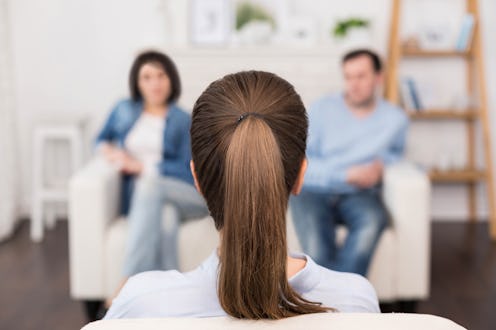Life
What To Do If You Want To Try Couples Therapy & Your Partner Doesn't

Almost every couple hits rough patches in their relationship. Whether it's something minor like a stubborn disagreement or something major like being on two different pages about the future, the hardships of relationships can be difficult to deal with. Going to couples therapy is a great way to have an unbiased third-party help you and your partner work out your issues. But this can only really be beneficial if both parties are willing to contribute to the process. And if your partner doesn't want to go to couples therapy, things can get a bit more complicated.
"Going to couples therapy can be immensely helpful and can, in many cases, save a relationship," Dr. Josh Klapow, PhD, clinical psychologist and host of "The Kurre and Klapow Show," tells Bustle. "However, the stigma associated with mental health, counseling, therapy, and the unknown of what might take place in a therapist's office often can make one or both individuals in the relationship hesitant to go."
There may be a number of reasons why someone wouldn't want to go to couples counseling. According to Dr. Marianna Strongin, clinical psychologist and founder of Strong In Therapy, these reasons can include a fear of accountability, a break in trust in regard to involving someone else in your personal relationship details, fear that it might lead to a breakup, having to confront uncomfortable feelings, embarrassment, shame, or fear of judgment from the therapist. These are all valid concerns to have. And if you've heard these concerns out and still feel as though you and your partner would gain from couples counseling, you might want to adjust the way you've been going about trying to convince them to go.
It's important to make your partner feel heard and not force them into going to counseling. If someone feels forced into therapy, it's likely that they won't gain from the experience, as they probably won't be as forthcoming during the process as necessary. So, if you feel your partner is entirely against therapy, don't book your appointment just yet. Instead, make sure you talk to your partner about why you want to go to therapy. Klapow says it can be helpful if you let your partner know that couples therapy is important to you and your joint relationship, and why you think that. And if after a discussion they don't see the point in going, and you're convinced that you need to, you might want to try asking them to go as a favor. "Tell them that you’d like them to at least try it," Klapow says. "Sometimes a partner will give a knee jerk no response and then once they have heard how important it is to you and have had some time to consider it will come around."
There are so many things that could lead you to seek out couples therapy. Whether small-scale or large, couples counseling can really make a difference. And even if your partner doesn't quite understand that, they should understand that changes need to be made, and you both can discuss a comfortable way to go about that. "Another alternative is setting up an hour a week just like therapy where the couple can check in with one another and talk about everything happening in the relationship," Strongin says. This way, you and your partner can start a system similar to therapy and see how that goes, eventually working your way up to therapy if entirely necessary.
The important thing is that you and your partner are communicating and are working toward the same goal. Whether you do this through couples therapy or on your own is up to you two.
Experts:
Dr. Josh Klapow, PhD, clinical psychologist
Dr. Marianna Strongin, clinical psychologist and founder of Strong In Therapy